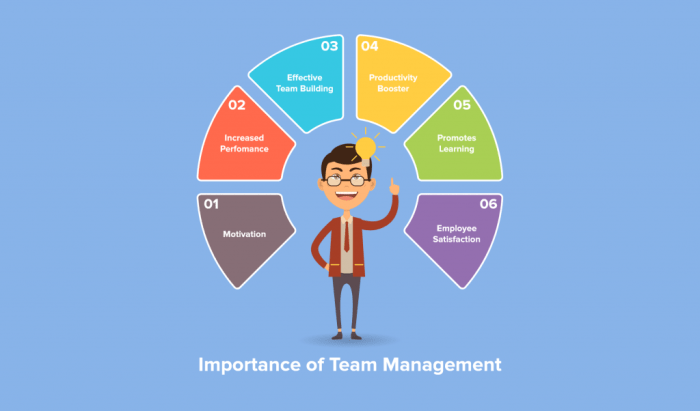Team Management Skills at the forefront, let’s dive into the world of effective leadership and teamwork. From boosting productivity to resolving conflicts, this journey is all about honing those essential skills for success.
Get ready to explore the key components, strategies for development, and challenges faced in the realm of team management. It’s time to level up your leadership game!
Importance of Team Management Skills
In today’s fast-paced work environment, team management skills play a crucial role in ensuring the success of a team. Effective team management can lead to improved productivity, enhanced collaboration, and ultimately, better results.
Enhanced Productivity
- When a team leader possesses strong team management skills, they can effectively delegate tasks, set clear goals, and provide timely feedback. This clarity and direction can help team members stay focused and motivated, leading to increased productivity.
- By fostering a positive work environment through effective communication and conflict resolution, team management skills can also help minimize distractions and keep the team on track towards achieving their objectives.
Improved Collaboration
- Team management skills involve creating a sense of unity and cohesion among team members. When team members feel valued, heard, and supported, they are more likely to collaborate effectively and leverage each other’s strengths.
- Effective team management can also promote a culture of trust and respect within the team, encouraging open communication, idea sharing, and creative problem-solving. This collaborative environment can lead to innovative solutions and improved outcomes.
Impact of Poor Team Management
- On the flip side, poor team management can have detrimental effects on overall team performance. When a team leader lacks the necessary skills to lead and motivate their team, it can result in confusion, disorganization, and low morale among team members.
- Without proper guidance and support, team members may struggle to work together effectively, leading to missed deadlines, decreased quality of work, and increased conflicts within the team.
Essential Components of Team Management Skills
Effective team management involves several key components that are essential for success in leading a team to achieve its goals.
Importance of Communication within Team Management
Communication is crucial in team management as it ensures that all team members are on the same page regarding goals, tasks, and expectations. Clear and open communication helps in avoiding misunderstandings, building trust among team members, and fostering a positive team dynamic. It also allows for feedback to be shared, problems to be addressed promptly, and ideas to be exchanged freely.
Role of Conflict Resolution in Effective Team Management
Conflict resolution is a critical component of team management as disagreements and tensions are inevitable when working in a group. A good team manager should be able to address conflicts in a fair and constructive manner, encouraging open dialogue and finding mutually beneficial solutions. Effective conflict resolution promotes a harmonious work environment, enhances team cohesion, and prevents issues from escalating and affecting team productivity.
Significance of Delegation and Task Assignment in Team Management
Delegation and task assignment are essential skills for a team manager as they help in distributing workload efficiently, utilizing team members’ strengths effectively, and ensuring that tasks are completed on time. Delegating tasks also empowers team members, fosters a sense of ownership and responsibility, and allows the team manager to focus on strategic planning and overseeing the overall progress of the project.
Proper delegation and task assignment contribute to improved efficiency, productivity, and overall team performance.
Developing Team Management Skills

Developing team management skills is crucial for fostering a cohesive and productive team dynamic. By implementing training and workshops, individuals can enhance their ability to lead and collaborate effectively within a team setting.
Strategies for Enhancing Team Management Skills
- Participating in leadership development programs that focus on communication, conflict resolution, and decision-making skills.
- Attending team-building workshops to improve trust, camaraderie, and problem-solving abilities within a team.
- Engaging in mentorship programs to learn from experienced leaders and gain practical insights into effective team management.
Examples of Team Management Exercises
- Role-playing scenarios where team members take turns leading a discussion or making decisions to improve leadership skills.
- Collaborative projects that require delegation, coordination, and feedback to enhance teamwork and organizational skills.
- Case studies and simulations that simulate real-world challenges to develop problem-solving and critical thinking abilities.
Importance of Feedback and Evaluation, Team Management Skills
- Feedback provides valuable insights into areas for improvement and helps individuals identify their strengths and weaknesses in team management.
- Regular evaluations allow team members to track their progress, set goals, and adjust their strategies for more effective leadership.
- Constructive feedback fosters a culture of continuous learning and development within a team, leading to improved performance and outcomes.
Challenges in Team Management

Managing a team comes with its fair share of challenges that can impact productivity and team dynamics. Identifying these challenges and finding effective strategies to overcome them is crucial for successful team management.
Communication Barriers
Communication barriers can hinder the flow of information within a team, leading to misunderstandings and conflicts. To overcome these barriers, managers can implement the following strategies:
- Encourage open communication: Create a culture where team members feel comfortable expressing their thoughts and ideas.
- Provide clear instructions: Ensure that tasks and expectations are communicated clearly to avoid confusion.
- Use multiple communication channels: Utilize different tools such as emails, messaging apps, and meetings to ensure all team members are informed.
- Active listening: Encourage active listening within the team to ensure that everyone feels heard and understood.
Conflict Resolution
Conflicts and disagreements are inevitable in a team setting, but how they are addressed can make a significant difference in team dynamics. To address conflicts effectively, managers can consider the following approaches:
- Promote open dialogue: Encourage team members to discuss their issues openly and find common ground.
- Focus on solutions: Instead of dwelling on the problem, shift the focus towards finding solutions that benefit the team as a whole.
- Mediation: In cases where conflicts escalate, consider bringing in a neutral third party to mediate and facilitate a resolution.
- Establish ground rules: Set clear guidelines on how conflicts should be addressed within the team to prevent escalation.
